STUDENT NEWS
Mirza Khyum Ph.D. student received the American Association of Textile Chemists and Colorists (AATCC) Foundation Scholarship.
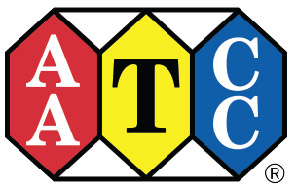
Congratulations to Mirza Khyum, a Ph.D. student at the Department of ENTOX, for receiving
the American Association of Textile Chemists and Colorists (AATCC) Foundation Scholarship.
AATCC is the leading professional association in the field of fibers and receiving
this support for research puts TTU on the map along with leading schools in the field
such as North Carolina State University.
Mirza Khyum received the Graduate Student Research Support Award by the Graduate School of Texas Tech University.
His work involves functionalized fibers and sustainable chemistry to look at fibers’ applications in healthcare and environment.
Guardians of the vineyard: Canines and chemistry work to combat powdery mildew
Researchers are now analyzing volatile chemicals emanating from grape leaves infected by a fungus called powdery mildew with the goal of improving training for vineyard canines.
Nayelly Rangel, a graduate student at Texas Tech University, will present the team's results at the Spring meeting of the American Chemical Society (ACS).
"Powdery mildew is one of the most contagious diseases that affects grapevine plants," says Rangel. "It reduces plant growth, fruit quality and quantity, and it can lead to a decline in wine quality."
The current method to identify an infection relies on humans looking for tell-tale patches of gray powder along plant leaves. But, by then, the condition is usually serious and requires large amounts of fungicide to eradicate.
Past research showed that dogs can identify powdery mildew by smell. But not much is known about the chemistry of what these animals smell, or whether the plants' odor profile changes as the infection progresses.
"Our four-legged friends don't talk, so we're trying to understand what they are encountering when they're sniffing," says Paola Prada-Tiedemann, a professor of forensic science at Texas Tech University who is leading the study.
So, the researchers set out to identify which volatile organic compounds, or airborne scents, grapevine leaves give off at different stages of powdery mildew infection.
First, the team needed a technique that would keep leaf samples intact for dog training. So, they placed a leaf inside a vial and inserted a tiny absorptive fiber into the vial to pick up chemicals from the air above a leaf. From there, the researchers characterized the volatile organic compounds (VOCs) stuck to the fiber by inserting it directly into a gas chromatograph-mass spectrometer.
"Our approach is unique because we're testing the exact location where a canine sniffs the grape leaf," says Rangel. "So, we're analyzing the same airspace in both scenarios, whether we're in the chemistry lab or the canine lab."
So far, the team has optimized their process from the VOCs emitted from healthy leaves. Initial results from comparisons of healthy and fungus-impacted grapes revealed that the baseline odors emitted from healthy leaves include more acidic odor compounds than sick ones.
In fact, healthy leaves released fewer vapors over time, says Rangel, in contrast to sick leaves that expelled more VOCs as the infection grew.
Next, the researchers will analyze the chemical composition of what's wafting off the leaves at different stages of infection. Once they've identified a few key molecules, they will present each one individually to the canines, measure the animals' responses to each, and test the smallest amount needed for detection. Like how certain scents, such as vinegar, are strong in small amounts, the researchers think that dogs may pick up on certain VOCs more easily than others. Using those compounds for training could enable more sensitive and accurate mildew identification, especially early-stage infections.
"The ultimate goal is to move away from the visual diagnosis of mildew to odor diagnosis as the gold standard," says Prada-Tiedemann. "Even when we can't see it ourselves, the dog sitting next to a plant can tell you with their nose, 'uh oh, that vine's starting to go.'"
By "bridging the canine to chemistry," as Prada-Tiedemann says, the team wants to find a more efficient solution for protecting grapevines from a widespread and damaging disease. After all, she adds, "We all want good wine!"
Mirza Khyum received AATCC Foundation Student Research Support

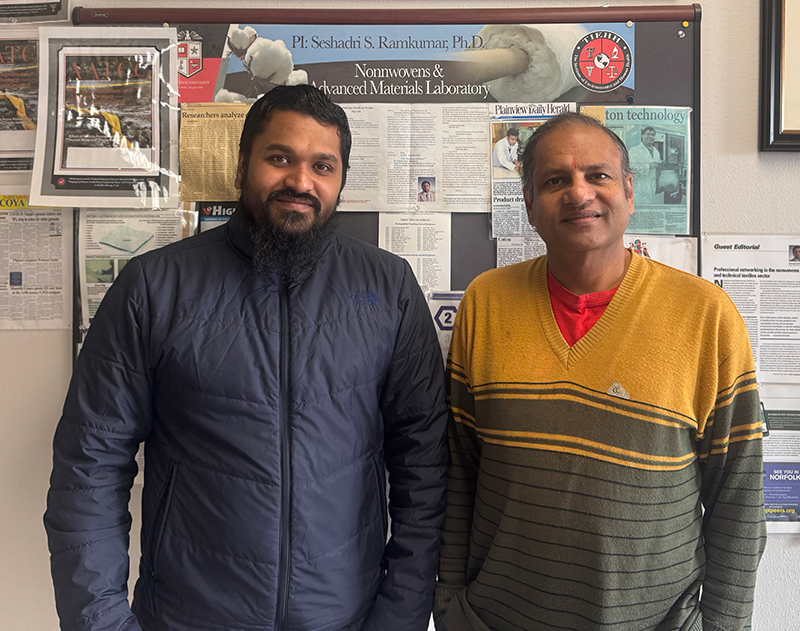
Mirza Khyum working under Professor Seshadri Ramkumar has received AATCC Foundation support for his research on plasma finishing of nanofibers.
Money received can be used to buy research supplies and in addition will receive up to $500 towards presentation of the work in AATCC International Conference.
Emilynn Banks Invited to Prague
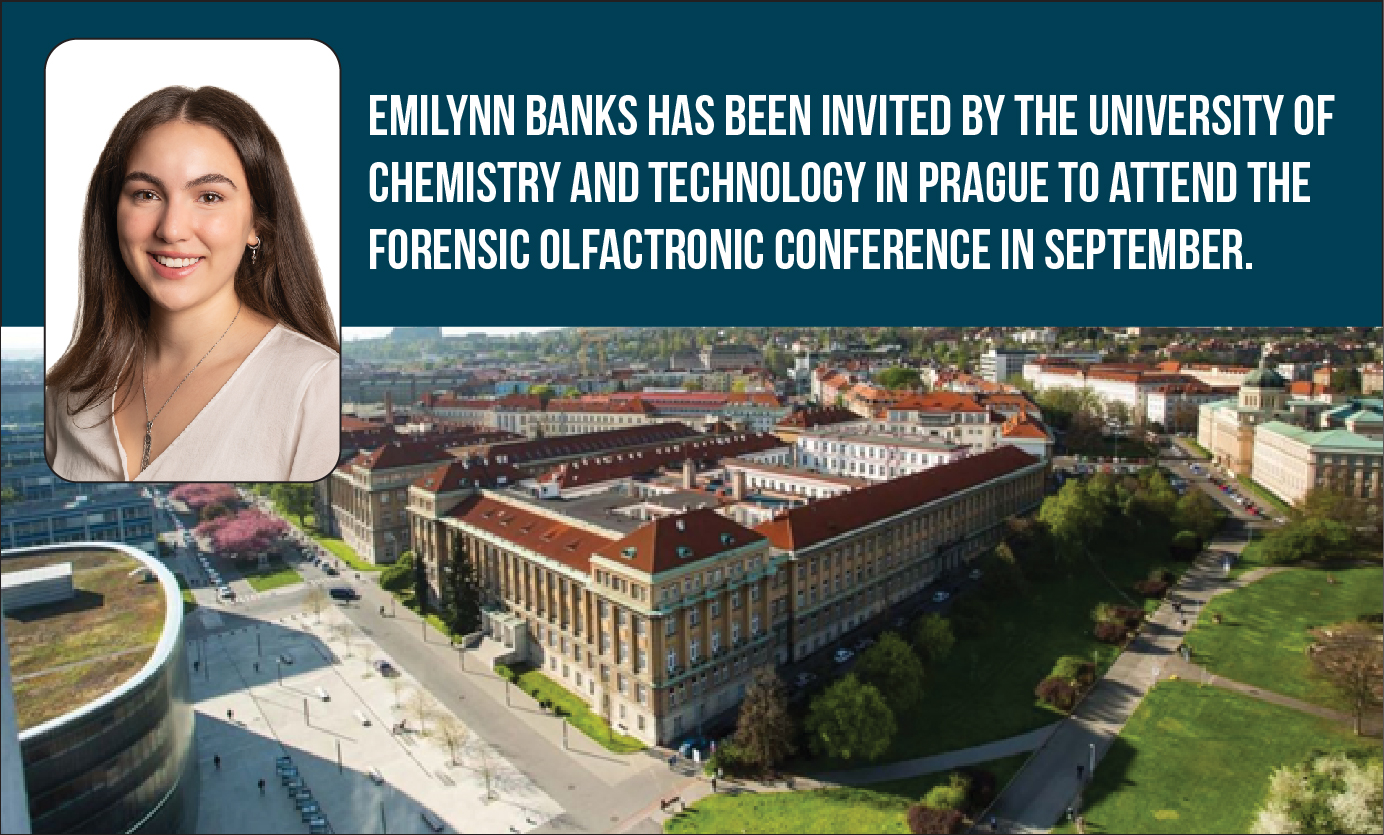
Heart researcher earns recognition for work on promising cardiac “patch”
Lihua Lou in the College of Engineering and Computing is investigating bioengineered heart tissue
Science & Technology
By David Drucker
September 21, 2023 at 11:00am
There are only so many ways to heal a broken heart, at least medically speaking. But thanks to new research, a promising treatment may be on the way.
Just ask FIU postdoctoral researcher Lihua Lou, who has been named the 2023 Early Career Stop Heart Disease Researcher of the Year by the Florida Heart Research Foundation. She is conducting research as part of an international team called CELL-MET to see how lab-made patches of tissue could repair damaged heart muscles.
CELL-MET is the National Science Foundation Engineering Research Center in Cellular Metamaterials, led by Boston University. FIU and the University of Michigan are major team members.
“It is my true honor to be recognized as this year’s Early Career Stop Heart Disease Researcher,” Lihua said. “I am incredibly proud to be a member of this research team conducting interdisciplinary research to find an innovative treatment for heart disease.”
One person dies every 33 seconds in the United States from cardiovascular disease, according to the Centers for Disease Control and Prevention. One of the main barriers to fighting heart disease is that damaged heart muscle tissue does not regenerate easily on its own. The CELL-MET team’s idea to overcome this obstacle is to replace damaged cells using a patch made of lab-made cardiac tissue which, when placed onto a damaged heart, could infuse healthy cells into an injured area.
Lou is specifically researching the patch’s ability to resist deformation under stress and its other mechanical and material characteristics. She works alongside FIU Distinguished University Professor Arvind Agarwal, a co-principal investigator of the team.
“I am incredibly proud to see Dr. Lou acknowledged by the Florida Heart Foundation,” Agarwal said. “This award is a testament to her outstanding work ethic, team-first mentality and exceptional research abilities.”
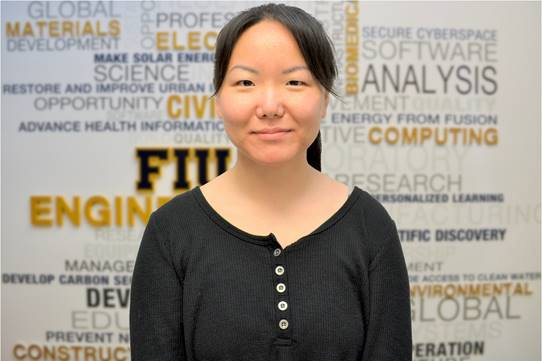
Lou uses a micro-indentation system for soft and ultra-soft materials.
With the award, Lou looks to develop a ‘golden standard’ for the mechanical properties of bioengineered cardiac tissue – a reference guide when creating heart bandages in the future. She will also work to create specialized equipment for measuring this data for cardiac tissue and similar tissues.
“Dr. Lou's groundbreaking work and her unwavering dedication to addressing the challenges of heart disease positioned her as an exemplary candidate for our award,” said the Florida Heart Research Foundation’s Medical Advisory Committee in a joint statement. “Her contributions extend beyond her research endeavors. Dr. Lou’s active involvement in cross-institutional projects, including collaborations with various universities, showcases her commitment to collaborative scientific advancement.”
“Additionally, Dr. Lou's mentorship of aspiring researchers and her prolific publication record of 22 journal papers underline her dedication to fostering scientific growth.”
Prior to FIU, Lou obtained a Master’s degree in textiles science and engineering, where she researched nanomaterials. She later earned a Ph.D. in environmental science, where she studied toxicology and how materials interact with the human body. She connects the dots across disciplines in her research today.
Other institutions involved in the research at CELL-MET include Brown University, CNEA (Argentina), Columbia University, École Polytechnique Fédérale de Lausanne (Switzerland), Fort Valley State University, Harvard Medical School, National University of Ireland, NHS College, North Carolina State University, Queen’s University Belfast (Northern Ireland) and the Wyss Institute.
Advanced textiles sector needs to engage with the end-user community
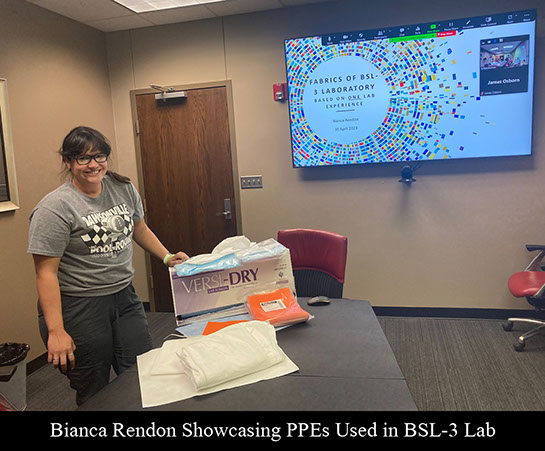
Dr Seshadri Ramkumar - April 13, 2023
Nonwovens and industrial textiles industry develops many products which are life savers, contribute to environmental protection and provide jobs, informs Dr Seshadri Ramkumar.
Advanced textiles sector such as hygiene and medical nonwovens needs to effectively outreach and engage with the end-user community.
Technical textiles use different fibres such as those that have functionality and those that are sustainable such as cellulose based. This technical information needs to be provided to practitioners like doctors, nurses, and laboratory personnel. In addition, disposal aspects, safe practices and sustainability efforts by the PPE industry must be relayed to those who use them daily. The end-user community is broad and hence the industrial and trade associations in the field can help the sector with engagement and outreach. The outreach efforts will help with greater buy-ins for the nonwovens and advanced textile products.
Nonwovens and industrial textiles industry develops many products which are life savers, contribute to environmental protection and provide jobs. The usefulness and details of the products need to be shared with the end-user community such as medical practitioners, nurses, hospital staff, emergency personnel, to name a few.
The outreach efforts will help with greater understanding on the characteristics and functionalities of these value-added products and will result in greater acceptance and buy-ins by the users. This aspect was evident in a presentation done in my graduate class on Fiber Forensics on April 11 by Bianca Rendon, researcher with the Biosafety Response Laboratory at Texas Tech University. This laboratory is a BSL-3 laboratory headed by Professor Steven Presley and was the first laboratory in the State of Texas to undertake the COVID-19 testing, when the pandemic broke out in early 2020 in the United States. The presentation highlighted different nonwoven and cotton-based textiles that are used daily by the personnel in biosafety laboratories.
“PPEs are lifesavers,” stated Rendon who uses different types of nonwoven-based PPEs daily when testing select and non-select biological agents.
Products such as PPEs with cotton cuffs, laminated and absorbent wipes, protective shrouds and helmets are a myriad of advanced textile products that are needed in medical and biological safety laboratories. “Practitioners like me will benefit if the industry provides us with information on the structure, finish applied on the products we touch and use on a daily basis,” added Rendon.
Technical textiles that are used in PPEs use different structures such as woven, nonwovens and laminates. Common fibres used are polypropylene in the case of nonwovens, medical drapes and coats use blends such as cotton, polyester, rayon, etc.
“I understood the different structures and functionalities of fibres after attending the Fibre Forensics class, and hence it will be useful if the industry reaches out to actual users of the products,” emphasized Rendon.
It was evident from the discussion that the user-community is interested in using safe methods, cost effective single use products and explore sustainable ways and products towards use and disposal.
The technical textiles sector has a lot of opportunities to penetrate different market segments by effective outreach and engagement with the daily user-community.
Congratulations Farzana Hossain and Shuangmei Tian
Farzana Hossain and Shuangmei Tian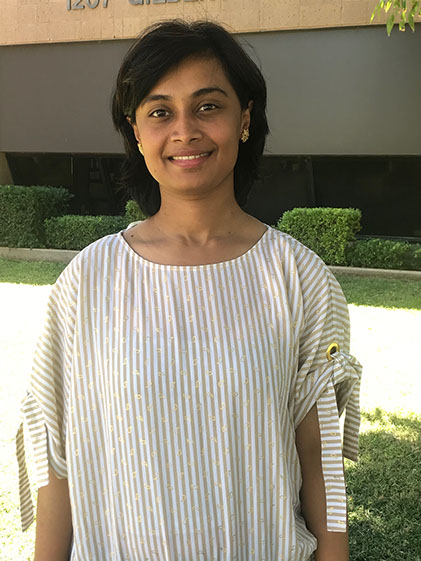
 for being award fellowships from the Graduate School for the 2023-24 academic year!!
for being award fellowships from the Graduate School for the 2023-24 academic year!!Farzana Hossain and Shuangmei Tian received Dissertation Completion Fellowships.
Department of Environmental Toxicology doctoral candidate Amanda Emert's first first-author paper has been accepted for publication in Environmental Pollution (Elsevier, I.F. 9.988).
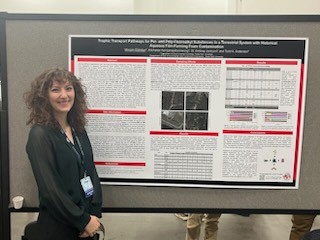
Coauthors include Frank Green, Dr. Seeni Subbiah, and Amanda's co-advisors Dr. Kerry Griffis-Kyle (Department of Natural Resources Management, TTU) and Dr. Phil Smith.
Amanda's work, which examines aerial transport of feedyard-derived pesticides, deposition into wetlands, and associated risk, is also featured in a story originally published by The New Lede.
SOVE
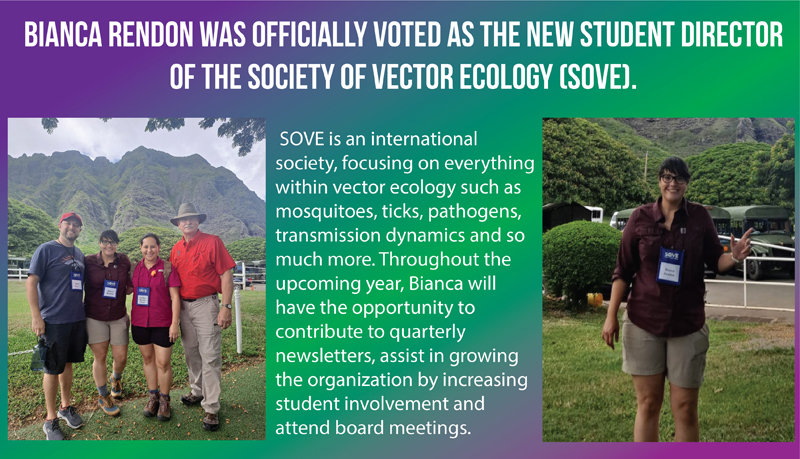
Kirchner Fellows for 2022-23
Shisbeth Tabora, a doctoral student in the Department of Environmental Toxicology at Texas Tech University’s Institute of Environmental and Human Health, was selected for the Kirchner Fellows for 2022-23
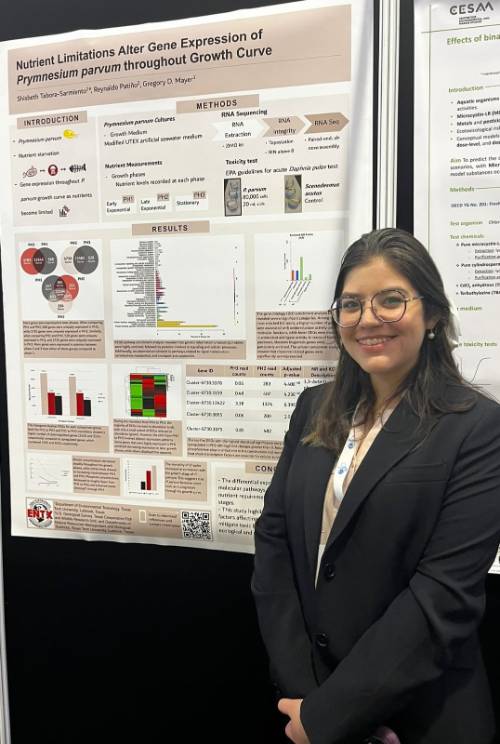
COVID-19 Testing Changes Trajectory for Doctoral Student
TTU Today highlights Bianca Rendon in 7-20-22 article: COVID-19 Testing Changes Trajectory for Doctoral Student
...Spring 2020 was supposed to be business as usual for Texas Tech University doctoral student Bianca Rendon. However, spring 2020 was easily the least “usual” semester in recent history as the novel coronavirus swept the planet. What used to be a clear path to a doctorate, was now anything but for Rendon.
She became a key part of The Institute for Environmental and Human Health (TIEHH) efforts to assist the Centers for Disease Control in testing for COVID-19 and the variants soon to follow as part of the Laboratory Response Network.
>> READ FULL ARTICLE
Department of Environmental Toxicology
-
Address
Department of Environmental Toxicology, Texas Tech University, Box 41163, Lubbock, TX 79409 -
Phone
806.742.4567
